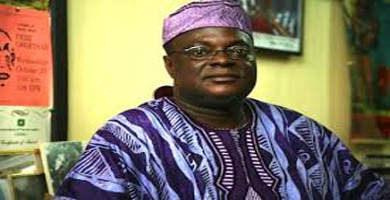
It is a testimony to his stature that, ahead of his 70th birthday today, Professor Femi Osofisan was early in the year named as the winner of the 2016 Thalia Prize of the International Association of Theatre Critics (IATC).
The honour is a celebration of Osofisan’s contribution to theatre through critical writing. But it also highlights his multi-dimensional devotion to the drama and the stage. As the first African and the first black to win the Thalia Prize, Osofisan has not only made a mark in his field; he has also shown the strength of Nigerian critical practice.
It is noteworthy that the Thalia Prize is meant to reward “the work of those who have helped critics around the globe to understand new ways of seeing and appreciating the performing arts worldwide.” Osofisan is in a luminous class as the 10-year-old prize has been won by UK-born critic, Eric Bentley (2006), Jean-Pierre Sarrazac (2008), Richard Schechner (2010), Kapila Vatsyayan (2012), and Eugenio Barba (2014).
The announcement of his high-profile international award for critical illumination, though related to his role as a playwright, gives an insight into another aspect of his theatre practice. His many-sided cultural activities can be seen from his functions as a playwright, director, actor, theatre manager, critic, poet, novelist, editor, newspaper columnist and public intellectual. His stint as the head of the country’s National Theatre was further evidence of his high rating in cultural circles.
It is a reflection of Osofisan’s internationally acknowledged standing that his nomination for the prize was jointly sponsored by the IATC’s Nigerian and Canadian Centres. The IATC, a UNESCO’s statute ‘B’ partner in theatre criticism, has been in existence for 60 years, and helps to promote international cooperation with its global membership of over 2,000 theatre critics.
The beauty of this award, which will be presented to Osofisan during the IATC Congress in Belgrade later this year, is its focus on elucidation. The critical enterprise plays a constructive role in the interpretation of drama, and it is a huge credit to Osofisan that his critical work is considered significantly interpretative and credited with fresh perspectives.
It is not for nothing that Harvard Professor Biodun Jeyifo described Osofisan as “the most African playwright of the post-colonial era…the most prolific playwright on the African continent…” in a lecture given at the University of Ibadan in 2006. Noted for the African style of his productions, Osofisan’s probably best-known play, Once upon Four Robbers (1991), is taught in many universities around the world and has been widely anthologised.
Notably, Osofisan’s plays demonstrate that he writes with a social conscience, and his critical writings also reflect an unmistakable activism in favour of the downtrodden. A significant feature of his plays is the use of various theatrical resources, and he is usually described as a playwright who does “total drama”.
It is worth mentioning that Osofisan has written over 50 plays and hundreds of critical essays, four novels and five collections of poetry. His creative work attracted international attention following a performance of his 1997 play Many Colours Make the Thunder King at the Guthrie Theatre in Minneapolis, U.S.A.
Currently a Distinguished Professor of Theatre Arts at the Kwara State University, Osofisan held various faculty positions at the University of Ibadan, Oyo State, where he retired as full professor in 2011. He attended the University of Ibadan and did post-graduate studies at the Sorbonne, Paris.
The founder of CentreStage Africa (the Centre for the Study of Theatre and Alternative Genres of Expression in Africa) and Vice-President of the Pan African Writers’ Association, Osofisan’s work is a remarkable service to culture.
As he becomes a septuagenarian, it is hoped that age would not weaken his cultural capacity.
END

A TRUE PROFESSOR! Someone whose office I visited while he headed the national theatre, Iganmu!